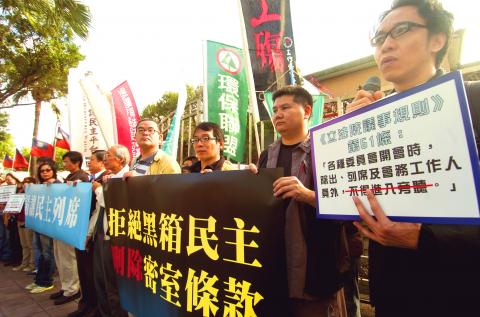A group of citizen journalists yesterday demanded that the legislature uphold the Constitution by recognizing citizen journalism and allowing the public to attend legislative sessions after their attempt to cover legislative affairs was rejected.
As the nation’s top legislative body, the legislature should not violate the Constitution by barring citizen journalists and legislation session visits, several citizen journalists and dozens of representatives from civic groups said during their protest in front of the legislature in Taipei which coincided with Constitution Day.
“Taiwanese should not be stripped of their constitutionally protected right to political participation,” Citizen Congress Watch chairman Shih Shin-min (施信民) said before the protesters tried to enter the legislature and apply for temporary media passes.

Photo: Wang Min-wei, Taipei Times
After being blocked by security at the gate of the legislative building for about 10 minutes, six representatives — including citizen journalist and documentary filmmaker Kevin Lee (李惠仁) — were allowed to enter, but their media pass applications were immediately rejected.
Lee Chien-hsin (李健行), director of the legislature’s Public Relations Office, said the requirements for obtaining media passes are clearly stated in the legislature’s regulations.
“If you [citizen journalists] have a problem with that, you should demand a Constitutional interpretation,” he said.
Citing Article 11 of the Constitution, which guarantees the rights to freedom of speech, teaching, writing and publication, and the Justices of the Constitutional Court’s Interpretation No. 689 as the basis of their appeal, Kevin Lee briefly argued with the PR office director, who subsequently left the scene without further explanation.
Currently, only reporters from media outlets which are registered companies are eligible for permanent media passes to cover legislative affairs.
“The legislative regulations are in violation of the Constitution,” said Kevin Lee, who is known for exposing the government’s cover-up of an avian flu outbreak earlier this year.
The protesters said the legislature’s refusal to recognize citizen journalism constitutes not only an erosion of constitutional rights, but also jeopardizes freedom of the press, which is already in a dire state amid growing Chinese influence in the media, as well as increasingly powerful media bias and corporate interests.
It is also important that the legislature allow professionals and private citizens to attend public hearings and legislative sessions, said Huang Shu-ying (黃淑英), a former Democratic Progressive Party legislator who now serves as president of civic group Taiwan Women’s Link.
In related news, the Association of Taiwan Journalists yesterday condemned the government’s infringing on press freedom and violation of the Constitution in its actions concerning the Fourth Nuclear Power Plant in New Taipei City’s (新北市) Gongliao District (貢寮), and the Miramar Resort Village in Taitung County’s Shanyuan Bay (杉原灣).
The Atomic Energy Council on Friday barred a reporter from covering meetings and activities related to the power plant, while the Taitung County Government barred reporters from an environmental assessment meeting for the controversial resort development.
“The Association of Taiwan Journalists condemns the practices by the central and local governments to systematically oppress the media freedom and strip reporters’ rights to gather information, which is a serious trampling of press liberties and a violation of the Constitution,” the association said in a press release.

‘DENIAL DEFENSE’: The US would increase its military presence with uncrewed ships, and submarines, while boosting defense in the Indo-Pacific, a Pete Hegseth memo said The US is reorienting its military strategy to focus primarily on deterring a potential Chinese invasion of Taiwan, a memo signed by US Secretary of Defense Pete Hegseth showed. The memo also called on Taiwan to increase its defense spending. The document, known as the “Interim National Defense Strategic Guidance,” was distributed this month and detailed the national defense plans of US President Donald Trump’s administration, an article in the Washington Post said on Saturday. It outlines how the US can prepare for a potential war with China and defend itself from threats in the “near abroad,” including Greenland and the Panama

A magnitude 4.9 earthquake struck off Tainan at 11:47am today, the Central Weather Administration (CWA) said. The hypocenter was 32.3km northeast of Tainan City Hall at a depth of 7.3km, CWA data showed. The intensity of the quake, which gauges the actual effect of a seismic event, measured 4 in Tainan and Chiayi County on Taiwan's seven-tier intensity scale, the data showed. The quake had an intensity of 3 in Chiayi City and County, and Yunlin County, while it was measured as 2 in Kaohsiung, Nantou County, Changhua County, Taitung County and offshore Penghu County, the data showed. There were no immediate reports of

The Chinese Nationalist Party (KMT) is maintaining close ties with Beijing, the Democratic Progressive Party (DPP) said yesterday, hours after a new round of Chinese military drills in the Taiwan Strait began. Political parties in a democracy have a responsibility to be loyal to the nation and defend its sovereignty, DPP spokesman Justin Wu (吳崢) told a news conference in Taipei. His comments came hours after Beijing announced via Chinese state media that the Chinese People’s Liberation Army’s Eastern Theater Command was holding large-scale drills simulating a multi-pronged attack on Taiwan. Contrary to the KMT’s claims that it is staunchly anti-communist, KMT Deputy

RESPONSE: The government would investigate incidents of Taiwanese entertainers in China promoting CCP propaganda online in contravention of the law, the source said Taiwanese entertainers living in China who are found to have contravened cross-strait regulations or collaborated with the Chinese Communist Party (CCP) could be subject to fines, a source said on Sunday. Several Taiwanese entertainers have posted on the social media platform Sina Weibo saying that Taiwan “must be returned” to China, and sharing news articles from Chinese state media. In response, the Mainland Affairs Council (MAC) has asked the Ministry of Culture to investigate whether the entertainers had contravened any laws, and asked for them to be questioned upon their return to Taiwan, an official familiar with the matter said. To curb repeated